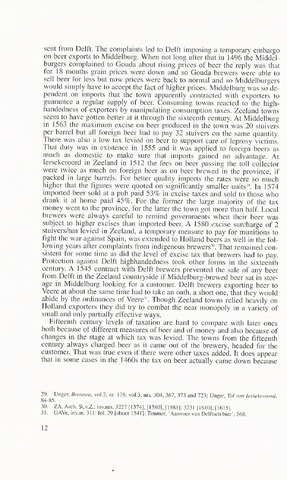sent from Delft. The complaints led to Delft imposing a temporary embargo
on beer exports to Middelburg. When not long after that in 1496 the Middel
burgers complained to Gouda about rising prices of beer the reply was that
for 18 months grain prices were down and so Gouda brewers were able to
sell beer for less bul now prices were back to normal and so Middelburgers
would simply have to accept the fact of higher prices. Middelburg was so de
pendent on imports that the town apparently contracted with exporters to
guarantee a regular supply of beer. Consuming towns reacted to the high
handedness of exporters by manipulating consumption taxes. Zeeland towns
seem to have gotten better at it through the sixteenth century. At Middelburg
in 1563 the maximum excise on beer produced in the town was 20 stuivers
per barrel but all foreign beer had to pay 32 stuivers on the same quantity.
There was also a low tax levied on beer to support care of leprosy victims.
That duty was in existence in 1555 and it was applied to foreign beers as
much as domestic to make sure that imports gained no advantage. At
Iersekeroord in Zeeland in 1512 the fees on beer passing the toll collector
were twice as much on foreign beer as on beer brewed in the province, if
packed in large barrels. For better quality imports the rates were so much
higher that the figures were quoted on significantly smaller units2". In 1574
imported beer sold at a pub paid 53% in excise taxes and sold lo those who
drank it al home paid 45%. For the former the large majority of the lax
money went to the province, for the latter the town got more than half. Local
brewers were always careful to remind governments when their beer was
subject to higher excises than imported beer. A 1580 excise surcharge of 2
stuivers/tun levied in Zeeland, a temporary measure to pay for munitions to
fight the war against Spain, was extended to Holland beers as well in the fol
lowing years after complaints from indigenous brewers30. That remained con
sistent for some time as did the level of excise tax that brewers had to pay.
Protection against Delft highhandedness took other forms in the sixteenth
century. A 1545 contract with Delft brewers prevented the sale of any beer
from Delft in the Zeeland countryside if Middelburg-brewed beer sat in stor
age in Middelburg looking for a customer. Delft brewers exporting beer to
Veere at about the same time had to take an oath, a short one, that they would
abide by the ordinances of Veere31. Though Zeeland towns relied heavily on
Holland exporters they did try to combat the near monopoly in a variety of
small and only partially effective ways.
Fifteenth century levels of taxation are hard to compare with later ones
both because of different measures of beer and of money and also because of
changes in the stage at which tax was levied. The towns from the fifteenth
century always charged beer as it came out of the brewery, headed for the
customer. That was true even if there were other taxes added. It does appear
that in some cases in the 1460s the tax on beer actually came down because
29. Unser, Bronnen, vol.2, nr. 178; vol.3, nrs. 304, 367, 373 and 723: Unger. Tol van Iersekeroord.
84-85.
30. ZA, Arch. Si.v.Z.: inv.nrs. 3227 [1574], 1580], [1581]; 3231 [16101. [1615].
31. GAVe, inv.nr. 311: fol. 29 [about 1541]; Timmer, 'Aanvoer van Delftsch bier', 568.
12

